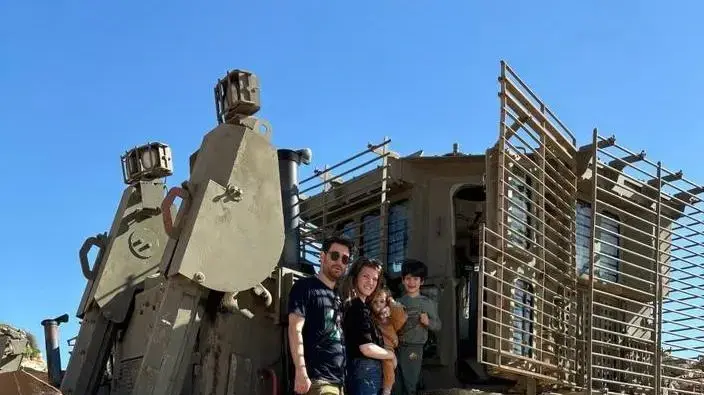The Chief of Staff in a reserve exercise in the north: the likelihood of war in the north is higher than before"/Doc
A new survey of reservists' wives, obtained by Walla!, reveals that the return to a family and marital routine after returning from the extended reserve service is not easy at all, and brings with it new and complex difficulties for the family unit.
Women tell of increased fights and arguments compared to the period before the war, and the need to "walk on eggs" when the partner comes home.
The survey, carried out by the research institute "The Brain Pool" for the Reservists' Wives Forum and included 1070 respondents, shows that more than a third (31%) report negative changes in their relationship with their serving spouse since he/she left for the reserves.
A quarter of them (22%) estimate that at the end of the war their relationship will be complex and full of gaps, and close to 40% may go to couples therapy after the end of the service.
The most difficult feelings the women describe is that their partner cannot accommodate their difficulties since the service period (29%).
On the other hand, there are good feelings of appreciation - more than 50% describe that their partner appreciates them more during this period.
"One of the harshest side effects, but less talked about."
Shani Nativ-Bar with her husband the reserve fighter and their children/courtesy of the photographed
Reserves in Gaza/Flash 90, Ill Margolin
The data also shows that more than 30% feel that it is the return of the spouse from the reserves that causes instability in the home, and close to a third estimate that there is a chance that they will decide to separate or divorce as a result of the changes.
In addition, more than 20% feel that they must emotionally detach from their spouse in order not to be hurt by the situation.
Dr. Ziv Horev, a marriage counselor, explains that prolonged reserve service violates the unwritten agreement that couples routinely maintain: "This agreement that includes, among other things, who does what at home, how we make each other happy and what are the limits of each of us - is violated at once , and makes room for feelings of loneliness, anxiety, and above all - powerlessness and lack of choice.
Even the system of gratitude is undermined.
For example, many of the female reservists were used to being appreciated for achievements at work, business successes, and the like.
They are not at all sure that they want to receive an assessment from their partner for their performance in the kitchen, for maintaining the house or for raising the children alone - and this is their main arena in the last four months."
"Even the system of gratitude is being undermined."
Dr. Ziv Horev/courtesy of those photographed
"Studies show that couples with high marital resilience have the ability to survive crises well. However, lately the couple have been going through very different experiences at the same time, and have to bridge the gaps when the realities, suddenly, without preparation, meet. A significant component in couples with high resilience is sharing and inclusion. The recipe It is to ignore such significant, albeit completely different, emotional experiences of each of the parties - and thus conclude a renewed marital agreement. Unspoken 'threats' threaten the return to closeness. Each and every one is entitled to express the difficulties that the fighting brought with it, independently of the other side." , explains Dr. Horev.
Shani Nativ-Bar, from the Reserve Women's Forum, commented on the survey: "The survey is a powerful initial testimony to the concerns and difficult feelings in the marital context;
One of the harshest, but least talked about, side effects of more than 100 days of combat.
Each of the spouses experienced a different war, some in the field and some in the rear, and the clashes are powerful and inevitable when you gather under the same roof, after so long.
We call on the Ministry of Defense and the Ministry of Welfare, first of all, to flood the issue in order to bring awareness, to make it more accessible and to provide extended torture to the families of the reservists - in the personal, marital and family context, in order to protect, also mentally, the small percentage of servants who protect the home of all of us.
The state must do everything to prevent deep and long-term damage."
More on the same topic:
Gaza war
War of Iron Swords
reserves
Reserves
Surveys

